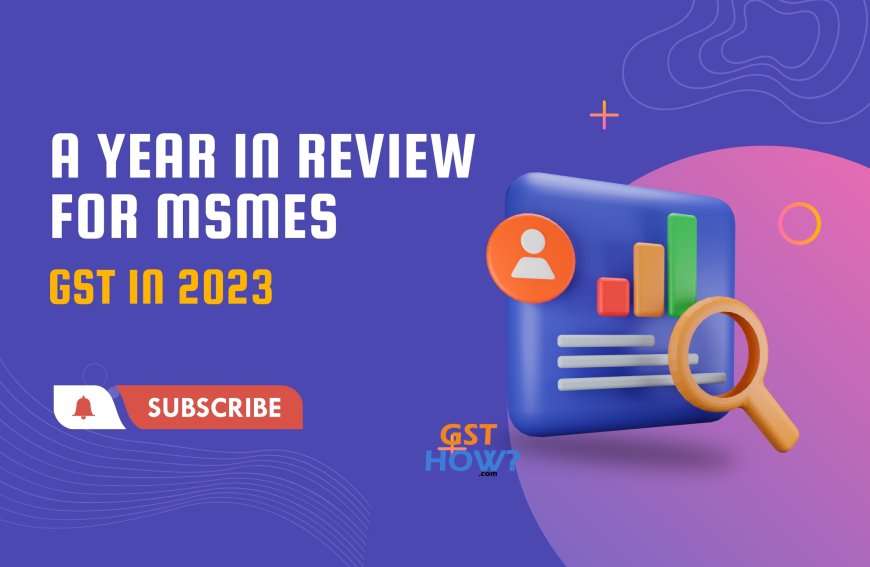GST in 2023: A Year in Review for MSMEs
This comprehensive article reviews the key developments in the Goods and Services Tax (GST) regime in 2023, focusing on their impact on Micro, Small, and Medium Enterprises (MSMEs) in India. It covers the major reforms, policy changes, and their implications for the MSME sector, providing insights into how these changes have shaped the business landscape.

Introduction
The year 2023 marked a pivotal moment for the Goods and Services Tax (GST) in India, particularly for the Micro, Small, and Medium Enterprises (MSMEs) sector. This sector, which forms the backbone of the Indian economy, experienced a series of GST-related developments that significantly influenced its operational dynamics and growth trajectory.
MSMEs’ Recovery Post-Covid
- Context: The Economic Survey 2022-23 shed light on the resilience of MSMEs in the face of the Covid-19 pandemic. Despite a downturn in FY21, the sector bounced back, surpassing pre-pandemic levels of GST contributions in FY20.
- Analysis: This recovery highlighted the sector's adaptability and the effectiveness of government interventions, including financial support and policy relaxations, which were crucial in mitigating the pandemic's impact.
Index for MSMEs’ Economic Activity
- Development: The launch of the MSME Economic Activity Index – Sumpoorn, in collaboration with SIDBI, was a significant step. This index, leveraging GSTN returns data, offered a more nuanced understanding of the economic activities within the MSME sector.
- Impact: The index served as a valuable tool for policy formulation, credit assessment, and tracking the health of the MSME sector, providing stakeholders with actionable insights.
Formalization of Non-GST Units
- Progress: The government's initiative to formalize informal micro units gained momentum with the Udyam Assist Platform (UAP). Over 1.10 crore informal micro enterprises registered for the Udyam certificate, marking a milestone in integrating these units into the formal economy.
- Significance: This formalization drive was instrumental in making these units eligible for priority sector loans, thereby enhancing their access to formal credit channels and government schemes.
Reduced Turnover Threshold for E-invoicing
- Policy Shift: In a major move, the turnover threshold for e-invoicing was reduced from Rs 10 crore to Rs 5 crore. This change, effective from August 2023, brought a larger pool of small enterprises under the e-invoicing framework.
- Rationale and Challenges: While this move aimed to enhance tax compliance and reduce fraud, it also posed challenges for smaller enterprises in terms of adapting to new technological requirements and compliance norms.
Intra-state Supply for Unregistered E-commerce Sellers
- Relief for E-commerce Sellers: The GST Council's decision to allow unregistered suppliers to engage in intra-state supply through e-commerce platforms was a boon for small e-commerce sellers. Effective from October 2023, this move was aimed at boosting the digital presence of micro enterprises.
- Broader Implications: This decision not only facilitated e-commerce for smaller players but also contributed to the digitalization of the MSME sector, opening up new avenues for growth and market expansion.
Challenges and Opportunities
- Balancing Act: The year 2023 presented a mix of challenges and opportunities for MSMEs. While adapting to new GST norms and digital compliance mechanisms was challenging, these changes also opened doors to more streamlined operations, better credit facilities, and greater market access.
- Digital Transformation: The push towards digital compliance and e-commerce integration was a significant step towards the digital transformation of the MSME sector, aligning it with global business practices.
Conclusion
- Transformative Year: 2023 was indeed a transformative year for MSMEs under the GST regime. The changes reflected the government's commitment to creating a conducive business environment and highlighted the sector's resilience and adaptability.
- Looking Ahead: As MSMEs continue to play a crucial role in the Indian economy, leveraging these GST-related developments will be key to their sustained growth and success. The sector's ability to adapt to these changes will determine its future trajectory in the increasingly digital and compliance-driven business landscape.


 GST How
GST How 







